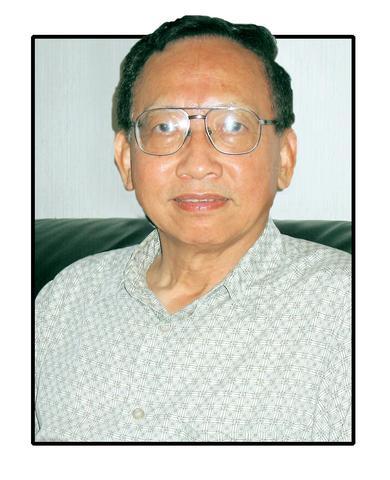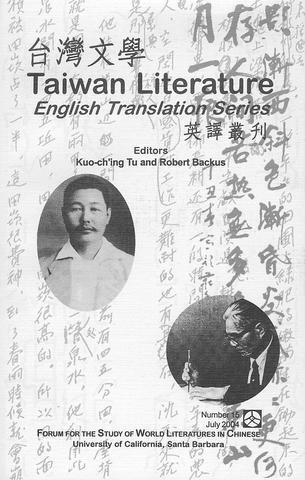Literary traditions are subjective things and the various merits of "canonical" writers are something that scholars have spent lifetimes arguing over. Tu Kuo-ching (
The definition of Taiwanese literature is a fraught question, seeing as it invokes linguistic, ethnic and nationalist sentiments, and also rubs up against the overwhelming presence of the literature of China. Tu boldly sweeps aside much of the debate when he states "Taiwanese literature is literature that deals with Taiwan, with this island and its experience."

"We simply cannot have a linguistic definition of Taiwanese literature," he said during an interview last week when visiting Taiwan to give a seminar on the various projects that he hopes to initiate as the Lai Ho and Wu Cho-liu Professor of Taiwan Studies. "If we say that Taiwanese literature must be written in Chinese, then we cut out many writers of the [Japanese] occupation."

PHOTO: IAN BARTHOLOMEW, TAIPEI TIMES
The question is quite fundamental for Tu, who dates Taiwanese literature from the Japanese occupation period, during which some seminal figures wrote in Japanese. Tu sees Taiwan's experience as unique and separate from that of its giant neighbor China, and therefore worthy of separate study.
"The impact of various foreign influences on Taiwanese literature have made it an important subject for comparative study from an international perspective, and have also warranted its study on a theoretical basis for eventual evaluation within a global vision," was how Tu put it during his inaugural speech on Aug. 30, this year. But it has been a long process to have Taiwan recognized as a separate field of academic study, especially within the international community. Against China's strongly nationalistic definition of what constitutes Chinese literature, Tu promotes a broader idea of Chinese literatures (with an emphasis on the plural), of which Taiwanese literature is a branch.
In 1996, Tu launched the Taiwan Literature English Translation Series published by Forum for the Study of World Literatures in Chinese, a scholarly journal dedicated to introducing Taiwan's literature to a broader academic community. The name of the publisher reflects Tu's desire to distance Chinese literature from a narrowly linguistic definition. "There is no reason why Chinese literature must come out of China," Tu said. "What about Chinese writers in Singapore and other Southeast Asian countries? What about literature in other languages about the Chinese experience?"
So within this broad context, Taiwanese literature can take its place among world literatures written in or by Chinese without any direct reference to the political entity of the People's Republic of China (PRC). "This is an idea that the PRC probably doesn't much like, for the Chinese tend to see such things in terms of monolithic unity -- we are the only one, we are the center -- but Chinese literatures are branches of the main body."
But ultimately, Tu wants to get away from seeing Taiwan literature too tightly linked to the Chinese language in any shape or form. "The ethnicity of the author is not really relevant, and the language he or she writes in can be transcended through translation. What is important is the world of that literature. This is an absolute." Taiwanese literature is about this island and its experience in the world, and rises above the popular debate about Chinese, Hokkien, Hakka and even Aboriginal languages. "It is about this land, its society, its people and its history. It doesn't matter if the author is Taiwanese or not."
As far as his insistence that Taiwan literature should be written in Hokkien, Tu says that this is simply "another chauvinism." Tu takes this further to say "what we call Taiwanese should include Mandarin, Hakka and even Aboriginal languages as well as Hokkien."
For Tu, the final arbitrator of literature is quality, and it really doesn't matter which of the Taiwanese languages are used. "I respect people who are trying to create a Hokkien literature, and if they can produce a book like Dream of the Red Chamber then many people will refer to it as the bible of Hokkien literature. If such a great writer did emerge in Hokkien, he or she could open up a new tradition within Taiwanese literature. But this is easier said than done."
While decrying the parochialism that has caused Taiwan literature to descend into bitter and often meaningless arguments over politically correct usage -- a tangled debate that is best know for the tortuous issue of Romanization of Chinese and Hokkien place names -- Tu insists that the only way out is through taking an international perspective, something he is well-placed to do in his new position. Starting next year, Tu will be launching a series of collected works by various major Taiwanese authors in English translation, including Yeh Shih-tau's (葉石濤) History of Taiwanese Literature (臺灣文學史綱). "This is very important for there is no good introduction to Taiwanese literature in English," Tu said. While some Taiwanese works have been translated into English, there is still an absence of a systematic body of work in translation. Howard Goldblatt, a distinguished translator who has worked on some of Taiwan's most important contemporary writers, has complained that there is a lack of interest in publishing Taiwanese works. Even though Tu's interest is primarily academic, saying that he will leave the study of writers from the 1980s on to others, knowing where Taiwanese literature came from is probably a good idea if we want to speculate about where it might be going. This can be seen clearly in the two writers whose names are attached to the endowed chair. Tu sees Lai Ho (賴和) as "the father of Taiwan's new literature," a pioneer who used literature as a means of resistance and struggle, in a way not dissimilar to the May Fourth New Literature Movement in China by which he was influenced. He insisted on using colloquial Chinese as his medium, equally rejecting the classical forms imposed by tradition and Japanese, imposed by an occupation government. Wu Cho-liu (吳濁流), the author of Asia's Orphan (亞細亞的 孤兒), the acknowledged masterpiece of Taiwanese literature, was born of Hakka parents and started his literary career writing in Japanese. These two authors perfectly showcase the unique and diverse qualities that have formed Taiwan's literature.
As recognition of Taiwan's unique experience grows, the field of Taiwan studies has also expanded in the international community. Important centers of study have such as the Society for Taiwan Studies at Tenri University and the Japan Association for Taiwan Studies in Japan, the Research Unit on Taiwan Culture and Literature at the Ruhr University in Bochum, Germany and others have been established to reflect the interest and importance attached to this new field. This is a great step forward from the situation little more than a decade ago when few would have acknowledged the separateness of what Taiwan represents. Tu's work carries on a process that can only gather momentum.

May 11 to May 18 The original Taichung Railway Station was long thought to have been completely razed. Opening on May 15, 1905, the one-story wooden structure soon outgrew its purpose and was replaced in 1917 by a grandiose, Western-style station. During construction on the third-generation station in 2017, workers discovered the service pit for the original station’s locomotive depot. A year later, a small wooden building on site was determined by historians to be the first stationmaster’s office, built around 1908. With these findings, the Taichung Railway Station Cultural Park now boasts that it has

The latest Formosa poll released at the end of last month shows confidence in President William Lai (賴清德) plunged 8.1 percent, while satisfaction with the Lai administration fared worse with a drop of 8.5 percent. Those lacking confidence in Lai jumped by 6 percent and dissatisfaction in his administration spiked up 6.7 percent. Confidence in Lai is still strong at 48.6 percent, compared to 43 percent lacking confidence — but this is his worst result overall since he took office. For the first time, dissatisfaction with his administration surpassed satisfaction, 47.3 to 47.1 percent. Though statistically a tie, for most

Six weeks before I embarked on a research mission in Kyoto, I was sitting alone at a bar counter in Melbourne. Next to me, a woman was bragging loudly to a friend: She, too, was heading to Kyoto, I quickly discerned. Except her trip was in four months. And she’d just pulled an all-nighter booking restaurant reservations. As I snooped on the conversation, I broke out in a sweat, panicking because I’d yet to secure a single table. Then I remembered: Eating well in Japan is absolutely not something to lose sleep over. It’s true that the best-known institutions book up faster

In February of this year the Taipei Times reported on the visit of Lienchiang County Commissioner Wang Chung-ming (王忠銘) of the Chinese Nationalist Party (KMT) and a delegation to a lantern festival in Fuzhou’s Mawei District in Fujian Province. “Today, Mawei and Matsu jointly marked the lantern festival,” Wang was quoted as saying, adding that both sides “being of one people,” is a cause for joy. Wang was passing around a common claim of officials of the People’s Republic of China (PRC) and the PRC’s allies and supporters in Taiwan — KMT and the Taiwan People’s Party — and elsewhere: Taiwan and